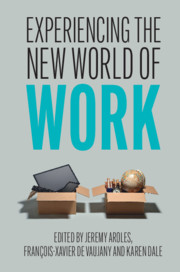Is there one future of work? This excellent volume shows that employment continues to be contested. For some, the the digital frontier of control has moved into the home or the delivery van. For others, the care home or field continues to be the site of low paid manual work. If you want a serious and evidence based analysis of current trends and future possibilities, then read this book.
Martin Parker - Professor of Organisation Studies, and Lead for the Bristol Inclusive Economy initiative,Department of Management, Bristol University
In an increasingly volatile, but also strangely predictable world, it is more important than ever that we remain academically alert to both the changes and continuities that characterise the experience of work. This rich and timely collection, focusing on the impact of contemporary workplace practices of – amongst others – embodiment, spatiality, and digitisation, makes a vital and accessible contribution to this endeavour.
Philip Hancock - Professor of Work and Organisation, Essex Business School, University of Essex
Why, asked the poet Philip Larkin, did he find the toad work squatting on his life? His answer was typically laconic: because inside himself, he observed, there was something toad like too, cold and heavy, always weighing on him. Work was its outward expression. Without the in-trays, regular hours, pension rights, class exploitation, and doleful routine he would be like those roaming or stumbling around the parks mid-afternoon with only empty chairs for friends. Within work, well, he was at least distracted from the inevitability of death. Nowadays, the toad has become a pond skater, neither heavy nor cold: it is elusive, nebulous, and humming with mediating technologies, and the empty chairs around the park bandstand have become workstations. It is in such a setting that the essays in this volume become incredibly timely. They give voice to a new, mobile cast of characters in the world of work: hackers, nomads, teleworkers, learning algorithms, makers, and platforms, in short a veritable commedia dell arte for our technologically mediated times. We learn how working humans are being joined by (better?) working non-humans, how exploitation has become a lifestyle choice – or intensified by poverty and confined invisibly to the peripheral spaces of the globe – and how, if there is any meaning to be found in such fluid, often exaggerated, and transitory experiences, it comes doused in irony. The field of study that is still, rather quaintly, called human relations needs completely uprooting. This volume makes an admirable foray into this radical work.
Robin Holt - Professor, Department of Management, Politics and Philosophy, Copenhagen Business School



